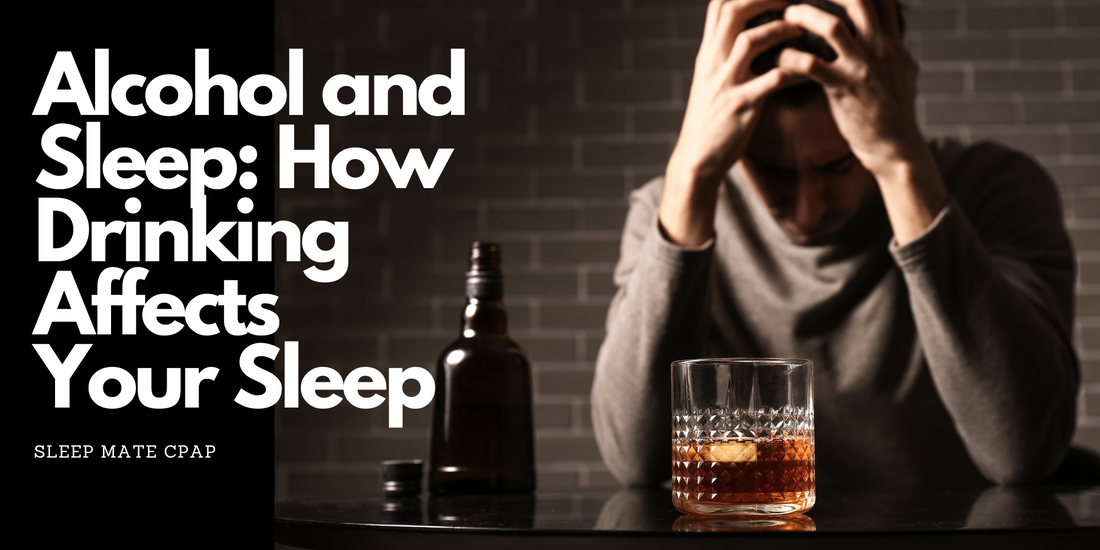
Alcohol and Sleep: What Every Sleep Seeker Should Know
Many of us have enjoyed a glass of wine or beer before bed to unwind, thinking it will ease us into sleep. But does alcohol actually improve sleep, or does it do the opposite? As pharmacists, we’re here to clarify the facts and help you make the best decisions for a healthier sleep routine.
Does Alcohol Really Help You Sleep?
Alcohol may make you feel relaxed and drowsy, but it doesn’t enhance sleep quality. On the contrary, studies show that while booze can help people fall asleep faster, it disrupts the natural sleep cycle, leading to a restless night and fatigue the following day. As it metabolizes, alcohol causes shifts in sleep stages, particularly in the latter half of the night, where sleep becomes lighter and more fragmented. Ever wondered why you’re wide awake at 3 a.m. after a few drinks? This is one reason.
Effects on Sleep Stages
Sleep involves multiple stages—light, deep, and REM sleep, each with unique benefits. While alcohol initially promotes deeper non-REM sleep, it disrupts REM sleep later on, which is critical for memory, mood regulation, and mental sharpness. REM sleep is when our brain processes emotions and experiences from the day, so losing out on it can impact how we feel and function. Regularly missing out on REM sleep can increase irritability and stress and even lower overall brain health, particularly as we age.
So, what exactly happens when alcohol interferes with sleep stages? It initially acts as a sedative, slowing brain activity and encouraging a brief period of deep sleep. But as the body metabolizes the drink, sleep becomes shallower, leading to frequent awakenings. You’re more likely to experience light sleep, making you prone to waking up tired and unrefreshed the next morning. Regular drinking before bed has even been linked to chronic sleep disturbances and can worsen insomnia over time.
The Role of Adenosine
Alcohol increases levels of adenosine, a chemical in the brain that promotes sleep, which is why people often feel drowsy after a drink. However, this effect is temporary. As adenosine levels drop, the body compensates by reducing deep sleep in the latter half of the night, leaving you feeling restless. Over time, the homeostatic drive—our body's sleep-wake balance—may become disrupted in those who regularly consume alcohol before bed, resulting in poor long-term sleep quality.
Effect on Melatonin and Circadian Rhythm
Our bodies rely on melatonin, the “sleep hormone,” to regulate sleep cycles in sync with the circadian rhythm. Drinking alcohol can decrease melatonin production, making it harder to fall asleep and stay asleep. Alcohol also impacts body temperature regulation and kidney function, both regulated by the circadian rhythm, leading to dehydration and discomfort. Recent studies suggest that even moderate drinking lowers melatonin levels, which could partly explain why alcohol contributes to sleep troubles and morning grogginess.
Alcohol, Snoring, and Sleep Apnea
For people with sleep apnea, drinking can be especially problematic. Alcohol relaxes muscles in the throat, increasing the likelihood of airway obstruction, which can worsen snoring and sleep apnea symptoms. Individuals with untreated sleep apnea who drink regularly are at a higher risk of more severe sleep interruptions, including periods of stopped breathing during sleep. This lack of oxygen not only disrupts sleep but also affects cardiovascular health. Find out more about what causes snoring and how to treat it HERE.
Alcohol’s Impact on Health and Mood Disorders
Interestingly, alcohol often exacerbates anxiety and depression, which are common among those who use alcohol to cope. Although a drink may seem to help with relaxation, alcohol disrupts the brain's neurotransmitters, often worsening these mental health issues. People who rely on drinking to manage insomnia, stress, or grief may find it actually intensifies sleep troubles. Studies indicate that alcohol-related sleep problems may create a cycle, where poor sleep leads to increased alcohol use, further impacting mental health.
How Much Alcohol Is Too Much?
So, is it possible to drink alcohol without harming your sleep? While it depends on individual tolerance, even small amounts can impact sleep. Research shows that just one or two drinks can reduce sleep quality by up to 9%, and higher amounts (three or more drinks) can decrease sleep quality by over 39%. A good rule of thumb is to limit alcohol intake, have alcohol-free nights, and avoid drinking within three to four hours of bedtime. Staying hydrated also helps minimize alcohol's effects on sleep by reducing dehydration.
Practical Tips for Better Sleep
If you occasionally drink, there are steps you can take to minimize the impact on your sleep quality:
- Limit Evening Alcohol Consumption: Avoid drinking within 3–4 hours of bedtime, so your body has time to metabolise it before sleep.
- Stay Hydrated: Drinking water helps offset dehydration, which is a side effect of alcohol and can worsen sleep quality.
- Practice Good Sleep Hygiene: Keep a regular sleep schedule, create a calm sleep environment, and avoid caffeine or heavy meals before bed.
- Balance Alcohol-Free Days: Taking breaks from alcohol can help restore natural sleep patterns and improve sleep quality over time.
- Increase exercise: Exercise plays an important role in sleep and can help people with insomnia. Find out more about exercise and sleep HERE.
Final Thoughts: Is Alcohol Really Worth the Cost to Your Sleep?
Though alcohol may seem like a shortcut to relaxation, its effects on sleep reveal a different story. As pharmacists, we encourage you to prioritize high-quality, restorative sleep by making choices that support your natural sleep cycles. If you’re struggling with sleep and alcohol is part of your routine, try cutting back gradually to see how it affects your sleep and energy levels.
Your sleep is essential, and a few lifestyle adjustments can make all the difference. Consider the benefits of a healthier, alcohol-light approach and, as always, consult a healthcare provider if you’re experiencing ongoing sleep issues or considering significant changes to your routine.

